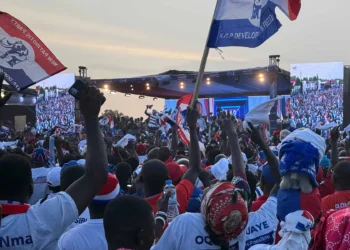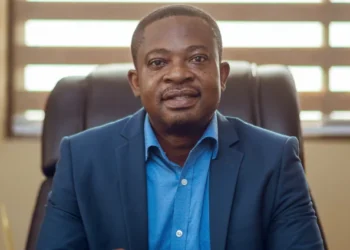Mussa Dankwah, Executive Director of Global InfoAnalytics, has raised critical concerns regarding the construction of the Hajj Village, questioning the justification for the project and the extent of government involvement.
His concerns come in the wake of the government’s claim that the facility is primarily an airport terminal building for check-in and pilgrim facilitation, owned and being built by the Ghana Airports Company Limited (GACL) without direct taxpayer funding.
Dankwah acknowledged the government’s position that no taxpayer money from the Consolidated Fund is directly financing the project.
However, he argued that since the GACL is ultimately state-owned, taxpayer money is indirectly involved.
While recognizing that the project does not appear as a line item in the national budget, Dankwah pressed for answers regarding its justification and long-term utility.
“Though taxpayers’ money is not directly being applied, GACL is ultimately owned by the taxpayer; hence, taxpayers’ money, albeit not directly from the consolidated funds.
“What is the justification, and what options were considered and discounted and for what reasons? What will be the use of the village after Hajj?”
Mussa Dankwah, Executive Director at Global InfoAnalytics
Dankwah also pointed out that Paul Adom Otchere, a prominent journalist and former Board Chair of GACL, was in office when the project was approved.
He suggested that Adom Otchere could help provide clarity on the decision-making process that led to the approval of the Hajj Village.
Comparison with the National Cathedral
Mussa Dankwah sought to differentiate the Hajj Village from the controversial National Cathedral project, which has faced intense public scrutiny over its funding and purpose.
“This project can’t be equated to the National Cathedral, both of which were started by the former government. The Hajj Village is not for worship but a transport facility”.
Mussa Dankwah, Executive Director at Global InfoAnalytics
Nonetheless, he argued that the existence of the Hajj Village itself is an indication of poor planning in the organization of Hajj in Ghana.
According to Dankwah, the lack of a well-structured process for Ghanaian pilgrims forces them to camp near the airport, leading to the perceived necessity for a Hajj Village.

““If things were done properly, we would not need this facility. Pilgrims should be able to book their Hajj, confirm departure dates, and travel from wherever they live to the airport to connect to their flights.
“But our Hajj planning is always in shambles. Pilgrims can’t tell which flight they might be on, hence uncertainties require them to pitch camp within the vicinity of the airport just in case their names are called”.
Mussa Dankwah, Executive Director at Global InfoAnalytics
Government’s Role in Religious Matters
As a practicing Muslim, Mussa Dankwah emphasized his firm stance against government involvement in religious affairs beyond facilitation.
He criticized state-sponsored pilgrimages, arguing that only financially capable individuals should perform Hajj.
“I oppose sponsoring poor people with taxpayers’ money to embark on Hajj because those persons don’t qualify to perform that religious obligation. If they don’t qualify, why should the state intervene?”.
Mussa Dankwah, Executive Director at Global InfoAnalytics
He stated that if political parties wish to sponsor their supporters to embark on Hajj, they are free to do so.
However, he maintained that the government, as a separate entity from political parties, should not undertake such responsibilities. “The government is not the same as NPP/NDC,” he stressed.
Mussa Dankwah dismissed accusations of political bias, asserting that his scrutiny of government actions remains consistent regardless of which political party is in power. “To those of you tagging me as a hypocrite, I was never one under Nana Addo, and I will not be under Mahama,” he stated firmly.
He underscored the importance of public scrutiny in ensuring good governance, emphasizing that governments are more likely to make informed decisions when they are aware of high levels of accountability.
“If we are this critical of any government action and that government listens, there is little chance that government will fail. They know the level of public scrutiny is high, and they will think hard before embarking on any project with direct or indirect taxpayers’ money”.
Mussa Dankwah, Executive Director at Global InfoAnalytics
He pledged to continue holding those in power accountable, regardless of political affiliations, stating that silence is not an option for those who seek better governance.
“We will not be silent so long as we want this country to be governed better. Those who don’t listen will face the people of Ghana at the ballot box”.
Mussa Dankwah, Executive Director at Global InfoAnalytics
Dankwah alluded to the lessons learned from the 2024 elections, suggesting that the government should not underestimate the power of public scrutiny.
He also dismissed attempts to discredit his critique through personal attacks, noting that insults are insignificant compared to the struggles of those who fought for Ghana’s democratic freedoms.
“No amount of name-calling or tagging me as an NDC foot soldier or NDC pollster will change anything. Insult is nothing compared to the suffering of those who fought to give us freedom”.
Mussa Dankwah, Executive Director at Global InfoAnalytics
Mussa Dankwah’s remarks highlight growing concerns over the rationale and transparency behind the Hajj Village project. His call for accountability underscores a broader debate on government spending, religious involvement, and political responsibility.
READ ALSO: Egypt’s Reconstruction Plan for Gaza Gains Momentum




















